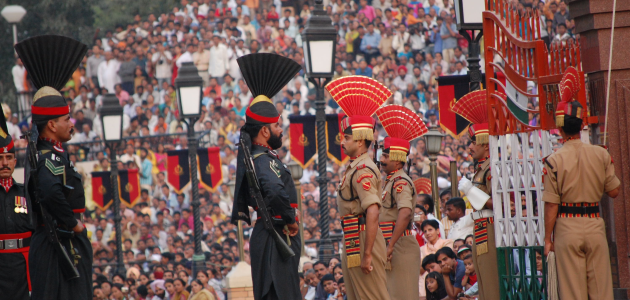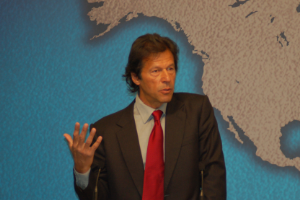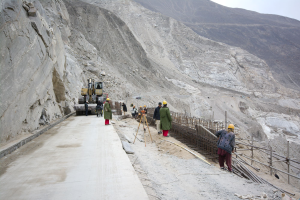The Course for Senior Officials crossed the border between Pakistan and India near Wagah at the only crossing point, which is open exclusively to passenger traffic.

Pakistani (left) and Indian (right) soldiers during the evening ceremony at the border crossing near Wagah. Picture: Gordon Dickson/Flickr/cut to size/CC BY-NC-SA 2.0
Every evening shortly before sunset, the only border crossing between India and Pakistan, open exclusively to passenger traffic, is closed with a spectacular ceremony. Deafening chants of “Pakistan, Pakistan” on the one side, and “Hindustan, Hindustan” on the other, are shouted by thousands of people on both sides of the border during the Wagah border ceremony. The Federal Academy’s 2018 Course for Senior Officials has also crossed the border at Wagah on foot to continue its journey in India.
The experience was preceded by intense conversations and discussions in Islamabad with numerous experts and decision makers from politics, the military, science, the media, and the diplomatic community. The discussions repeatedly focused on the opportunities and possibilities of Pakistan’s new government under Prime Minister Imran Khan as well as the current situation and effects of the mega project known as the China-Pakistan Economic Corridor (CPEC). One main focus during the first part of the journey was on comprehending, understanding and drawing own conclusions from the opinions and explanations contributed by the discussion partners.
The New Khan Government

Imran Khan, the former famous cricketer, became prime minister of Pakistan in August 2018. Picture: Chatham House/Flickr/cut to size/CC BY 2.0
Pakistan’s new government has not yet completed its first hundred days. It is no surprise that expectations are high on all sides. But in a country strongly influenced by Islam, it seems there is limited room for manoeuvre at the political level. Opinions and attitudes cannot be changed from one day to the next. However, in view of rapid population growth and the strong emphasis on religion in education and raising, particularly in rural areas, this seems urgently necessary, especially in terms of the country’s future. It is possible that Imran Khan, as a former cricket star who enjoys popularity well beyond the borders of Pakistan, could open new opportunities for a cross-border dialogue with India. On the whole, the current attitude towards the new government seems mostly favourable, although also still somewhat cautious, especially on the part of the military. It has been acknowledged that there is considerable need for reform. Prime Minister Khan seems willing to address these reforms, although it remains to be seen whether he can implement them.
CPEC as part of the Belt and Road Initiative

The upgrading of the Karakoram Highway is a further component of China’s Belt and Road Initiative. Picture: Christian Benke/Flickr/cut to size/CC BY-NC-SA 2.0
The CPEC mega project, which is divided into several phases, is already being implemented. It is part of the Belt and Road Initiative. With the help of substantial Chinese investment, the project initially involves a reform of the energy sector and the establishment of Special Economic Zones (SEZs) alongside traffic infrastructure, some of which has yet to be developed at later stages. The project has already delivered its first successes. A large number of temporary low-wage jobs were created in the construction sector, and power outages are almost a thing of the past. Meanwhile, the power grid is becoming overloaded with overcapacity generated with fossil fuels. The profits are skimmed off by Chinese investors and operators, which inevitably leads to price increases compared to the energy that was formerly generated through hydropower. The fossil fuel energy also causes additional pollution that could be avoided. It remains to be seen whether the concept of bringing foreign investors and producers into the SEZs will be a success. There is some room for doubt. In addition, the “all-weather friend” China has assigned approximately 20,000 Chinese workers, most of them engineers, to carry out the project in Pakistan. It will not be long before this leads to cultural changes in the areas where this workforce is concentrated. The first traders and service providers have already adjusted to the altered demand.
Journey continues to Delhi and Mumbai
To gain a more comprehensive impression of South Asia, the border crossing into India was followed up with further talks in Delhi and Mumbai. In Delhi, the course participants will talk with representatives from the areas of politics, science and civil society, while the agenda in the financial and economic centre of Mumbai will primarily focus on economic and social topics. The aim will again be to learn more about the perspectives and opinions of experts and decision makers. The hope remains that dialogue and reconciliation will lead to the border remaining permanently open and the Wagah border ceremony, as a daily celebration of its closure, going down in history as a cultural peculiarity.
Author: Peter Härle
